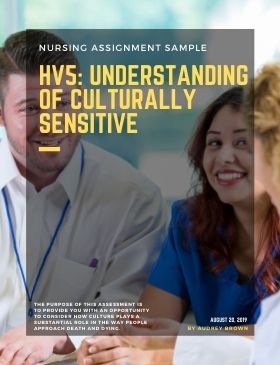
You can download the sample Nursing case study on Critical review of case in Health management with the following question for free at the end of this page. For further assistance with Nursing Assignment help, please check our offerings in Nursing assignment solutions. Our subject-matter experts provide online assignment help to Nursing students from across the world and deliver plagiarism free solution with a free Turnitin report with every solution.
(AssignmentEssayHelp does not recommend anyone to use this sample as their own work.
Nursing Assignment Questions
Aim of assessment
The purpose of this assessment is to provide you with an opportunity to consider how culture plays a substantial role in the way people approach death and dying. Indigenous cultural practices differ significantly to those of other cultures and as a nurse working in a palliative setting, it is important that you have a good understanding of such cultural practices
Discussion conveys consistent evidence of synthesis in Illustrating understanding of Indigenous people's cultural beliefs and traditions relating to death and dying.
Discussion conveys consistent evidence of critical analysis in Illustrating understanding of Indigenous people's cultural beliefs and traditions relating to death and dying.
Nursing Assignment Solutions
DEATH AND DYING IN ABORIGINAL TRIBES
The death and dying belief, cultural practices differ from communities to communities. In Aboriginal culture, the name of dead persons is not taken or written as they believe it disturbs their soul and might recall them. In northern territory, the laws are very stringent. Therefore having a northern territory Aboriginal tribe can lead to issues in a hospital or clinical environment. For an example- Post death the dead person need to be spoken out for documentation and discharge paper. Similarly for generating death certificate and much other documentation works it demands the deceased name must be uttered. In such cases, care must be taken and the attendants must be made to understand the importance of the process.
Similarly, with no access to mainstream health care services, they are very often treated by their indigenous medical professionals having little or no knowledge about contemporary medical services. They might resist the type of care facilitated at palliative care settings. In such cases, the nurses must give respect to their views and allow them to practice until and unless, it is not harming the patient or disturbing the hospital environment (McGrath and Philips, 2008).
In aboriginal culture, looking directly into the eyes of patients is considered as offensive. In health care communication, eye contact is taken as a positive aspect that helps in the establishment of a therapeutic relationship. Although, this seems to be impractical yet nurses must address the issues with an alternative approach. The health care decisions are usually taken by the community or family persons, where the power is distributed according to gender and levels in the family. Similarly, gender issues also exist where women issues are considered Women business. Therefore, while addressing female patients in palliative care, it must be noted female care givers must be appointed (Obrien et al, 2013).
The ceremonies usually followed after death are very important and must be followed strictly in the Aboriginal community. After death, the ceremonies must be conducted in a correct way and in the presence of a correct person. After death, the person is either buried or disposed of. In some cases, the person is usually left outside for last days or hours. In certain communities smoking of the room is done in order to purify the room. All these customs have direct implications for palliative care. Therefore when a patient dies and must be escorted to their homeland in order to give respect to their culture and tradition (McGrath, 2007).
Similarly, post death the ward can be filled with smoke as per their tradition. Even if, the body parts are amputated it must be collected and wrapped with full respect and must be escorted.
The death and dying culture, traditions and beliefs differ from community to community. Their spiritual practices differ a lot. For example, they believe in two soul trajectories and fate. Therefore being a nurse in palliative they must have good knowledge of traditional belief and practices. The question is how to accommodate such practices and belief in a hospital ward. In aboriginal communities, elders are highly respected. Therefore, nurses must take their elder person opinion before proceeding for any medical or non-medical interventions. Although at times, it might sound impractical yet it has many implications for Aboriginal cultures (Smith, 2012).
Another important aspect which must be considered while providing palliative care is to look from an Aboriginal perspective. In certain tribes, maintenance of a quality of life is important rather than improving the health condition or medical interventions. In such cases, the tribes and communities usually prefer less medical interventions and more personal and spiritual interventions in order to keep their spirit up. As they believe death is the creator's choice so the interventions must be minimal in order to give respect to the creator's choice. Although, it might sound non-medical and can give rise to an ethical dilemma. In such situations, novice nurse must ask experienced nursing professionals having experience in Aboriginal palliative care. Alternatively making them understand the importance of intervention in the maintenance of a quality of life will help in addressing the issue.
In general hospital environments, the opinion of doctors or nurses is sought in case of palliative care or end of life care. But this approach might be disrespectful for the aboriginal people or tribes. As per their belief, every individual has certain identity and integrity. Therefore, their opinions must be respected irrespective of their effects. If this term is applied to an Aboriginal palliative care patient, it might breach the bio-medical ethics. In such cases, communicating with the patient attendant and implementing patient representative accepted interventions will help in resolving such issues in health care domain. At the same time, certain terms and conditions are advantageous to the contemporary medical care system. As mentioned previously, they give respect to elder personalities. In such cases, if a senior most doctor or physician will provide any opinion; they ought to give respect to them (Issacon et al, 2014).
(Some parts of the solution has been blurred due to privacy protection policy)


 WhatsApp Us
WhatsApp Us